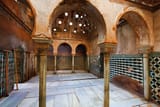Sub-Saharan Africa(medieval times)
In post-classical Kilwa, plumbing was prevalent in the stone homes of the natives. The Husani Kubwa Palace, as well as other buildings for the ruling elite and wealthy, included the luxury of indoor plumbing.
In the Ashanti Empire, toilets were housed in two story buildings that were flushed with gallons of boiling water
Islam stresses the importance of cleanliness and personal hygiene. Islamic hygienical jurisprudence, which dates back to the 7th century, has a number of elaborate rules. Taharah (ritual purity) involves performing wudu (ablution) for the five daily salah (prayers), as well as regularly performing ghusl (bathing), which led to bathhouses being built across the Islamic world. Islamic toilet hygiene also requires washing with water after using the toilet, for purity and to minimize germs
